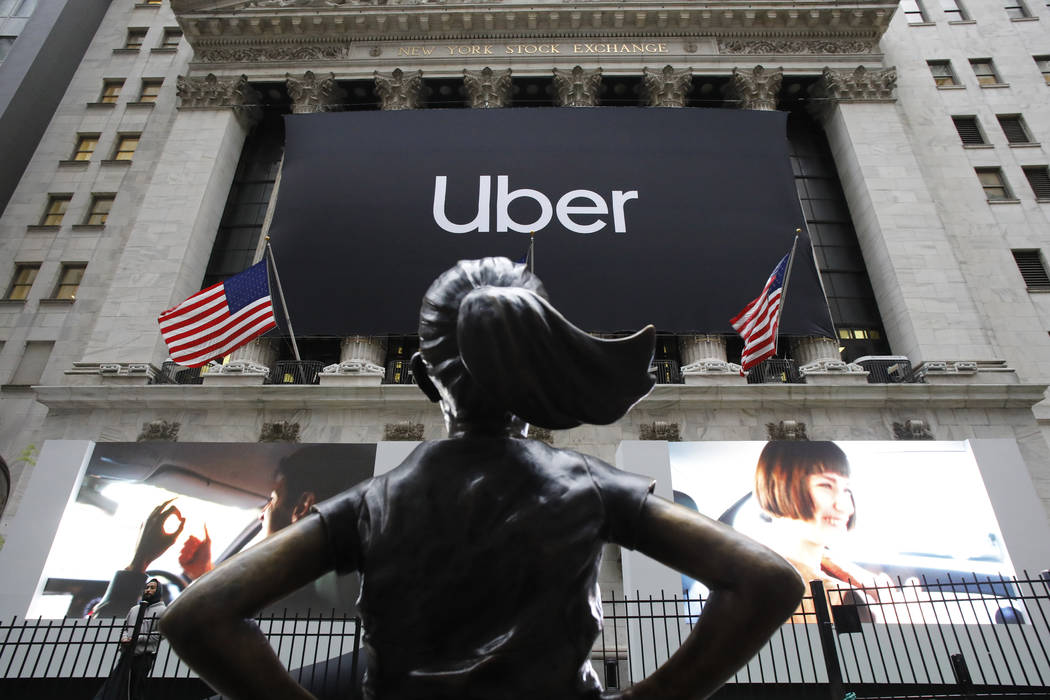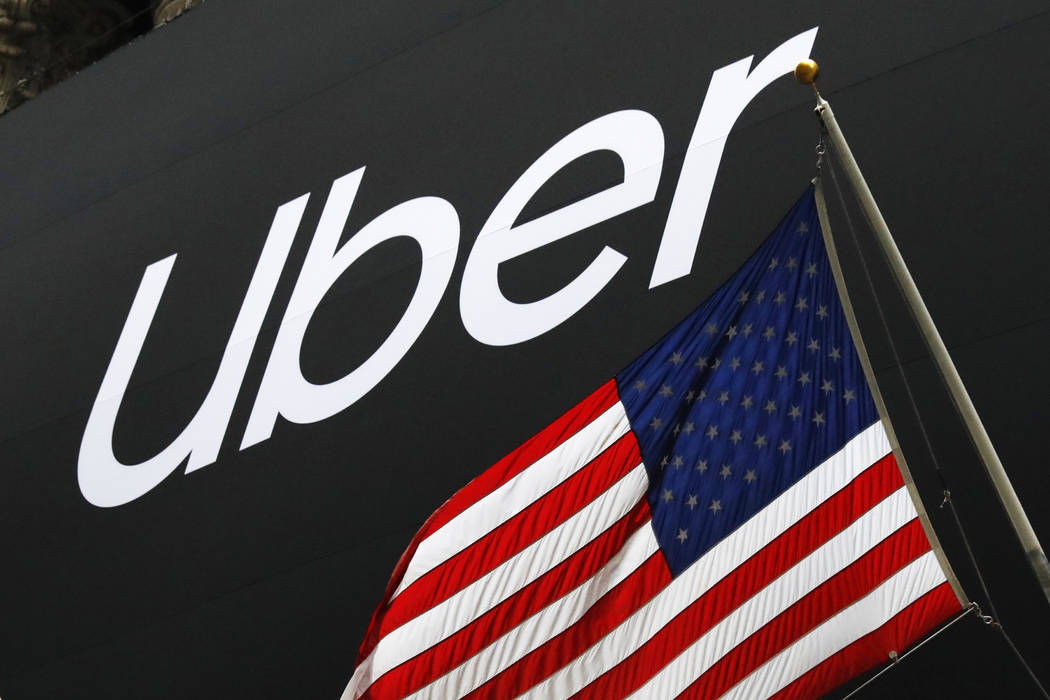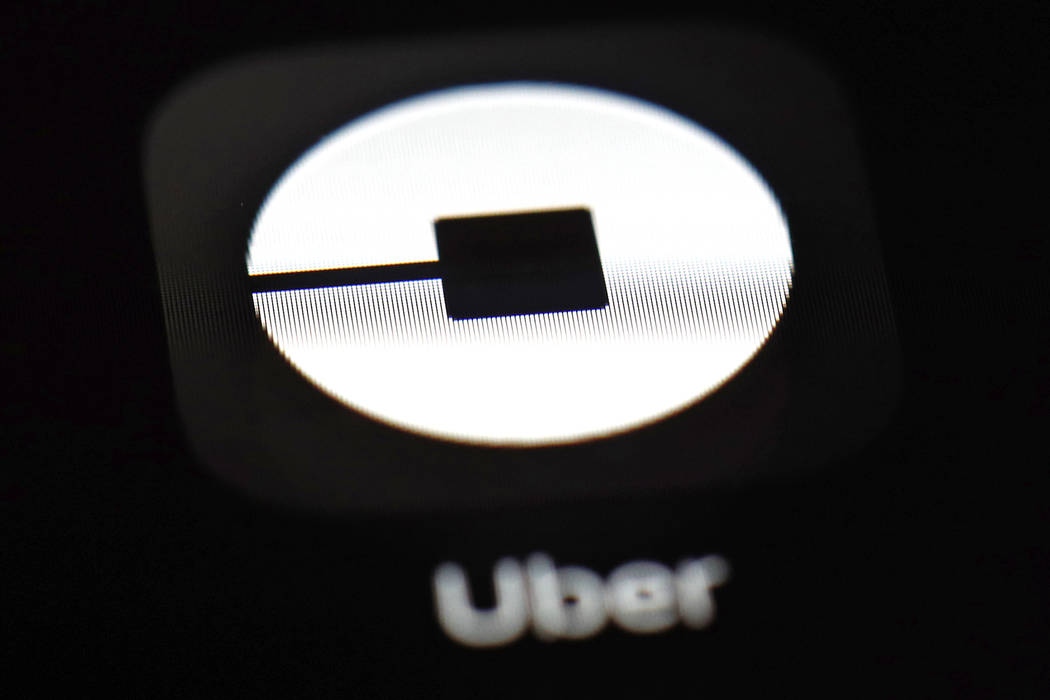Uber falls 7% below initial offering, valued $82B
NEW YORK — Uber began trading as a public company at $42 per share Friday, nearly 7% below its initial public offering price on an already volatile day for the markets.
The ride-hailing giant sold shares in the IPO at $45 each, raising $8.1 billion and giving the company a valuation of $82 billion. Shares began trading about 2 1/2 hours after the markets opened Friday, with investors already feeling jittery over an escalating trade dispute with China.
CEO Dara Khosrowshahi tried to manage expectations for the first day of trading, telling CNBC that Uber investors are in it for the long ride.
“Today is only one day. I want this day to go great, but it’s about what we build in the next three to five years,” he said in an interview with CNBC. “And I feel plenty of pressure to build over that time frame.”
Potential $12T market
Uber, Khosrowshahi said, is dealing with a potential $12 trillion market so “it makes sense to lean forward.”
Khosrowshahi and other company officials stood on a balcony above the New York Stock Exchange earlier in the morning and clapped as the bell rang to signal the start of the day’s trading.
The IPO price on Thursday came in at the lower end of Uber’s targeted price range of $44 to $50 per share. The caution may have been driven by escalating doubts about the ability of ride-hailing services to make money since Uber’s main rival, Lyft, went public six weeks ago.
Bad timing
Jitters about an intensifying U.S. trade war with China have also contributed to the caution. All major indexes down at least 1% on Friday after the two countries failed to reach a deal before Friday’s tariff deadline.
SharesPost principal analyst Alejandro Ortiz said the timing for Uber to start trading was bad given the uncertainty over the trade spat with China. But Uber’s story can’t be just one day of trading because of its potential to make billions in a growing ride market, he said.
“It’s going to keep bouncing around for months to come,” Ortiz said. “It’s an important thing to consider if you’re an investor and you saw value in the company and its disruptive potential, nothing has really changed in the past 48 hours.”
The true story of Uber will come with quarterly earnings reports and at the end of the six-month lockup period in which original IPO investors are prohibited from selling their shares, Ortiz said.
Even at the tamped-down price, Uber now has a market value of $82 billion — five times more than Lyft’s.
Austin Geidt, one of Uber’s first employees, rang the opening bell. She joined the company nine years ago and is now head of strategy for the Advanced Technologies Group, working on autonomous vehicles. Over the years, she helped to lead its expansion in hundreds of new cities and countries.
Both Uber co-founders Travis Kalanick and Garrett Camp were present at the exchange but absent from the podium during the bell ringing.
A black Uber logo was hanging over exchange floor and bright green Uber Eats trucks were parked outside. Men in black T-shirts and hats with the Uber Eats logo handed out drinks and snacks on the trading floor while photos of sedans, helicopters and Jump bikes were shown on screens above.
Transformative company
No matter how Uber’s stock swings Friday, the IPO has to be considered a triumph for the company most closely associated with an industry that has changed the way millions of people get around. That while also transforming the way millions of more people earn a living in the gig economy.
Uber’s IPO raised another $8.1 billion as the company it tries to fend off Lyft in the U.S. and help cover the cost of giving rides to passengers at unprofitable prices. The San Francisco company already has lost about $9 billion since its inception and acknowledges it could still be years before it turns a profit.
That sobering reality is one reason that Uber fell short of reaching the $120 billion market value that many observers believed its IPO might attain.
Another factor working against Uber is the cold shoulder investors have been giving Lyft’s stock after an initial run-up. Lyft was down 4% to $53.18 per share on Friday, hitting an all-time low since it began trading in April with an IPO price of $72.
Uber “clearly learned from its ‘little brother’ Lyft, and the experience it has gone through,” Wedbush Securities analysts Ygal Arounian and Daniel Ives wrote late Thursday.
Despite all that, Uber’s IPO is the biggest since Chinese e-commerce giant Alibaba Group debuted with a value of $167.6 billion in 2014.
“For the market to give you the value, you’ve either got to have a lot of profits or potential for huge growth,” said Sam Abuelsamid, principal analyst at Navigant Research.
Growth galore
Uber boasts growth galore. Its revenue last year surged 42% to $11.3 billion while its cars completed 5.2 billion trips around the world either giving rides to 91 million passengers or delivering food.
Uber might be even more popular if not for a series of revelations about unsavory behavior that sullied its image and resulted in the ouster of Kalanick as CEO nearly two years ago.
The self-inflicted wounds included complaints about rampant internal sexual harassment , accusations that it stole self-driving car technology, and a cover-up of a computer break-in that stole personal information about its passengers. What’s more, some Uber drivers have been accused of assaulting passengers, and one of its self-driving test vehicles struck and killed a pedestrian in Arizona last year while a backup driver was behind the wheel.
Uber hired Khosrowshahi as CEO to replace Kalanick and clean up the mess, something that analysts say has been able to do to some extent, although Lyft seized upon the scandals to gain market share.
Kalanick remains on Uber’s board and while he kept a relatively low profile on Friday, he can still savor his newfound wealth. At $45 per share, his stake in Uber will be worth $5.3 billion. Hundreds, if not thousands, of other Uber employees are expected to become millionaires in the IPO.
Driver complaints
Meanwhile, scores of Uber drivers say they have been mistreated by the company as they work long hours and wear out their cars picking up passengers as they struggle to make ends meet. On Wednesday, some of them participated in strikes across the United States to highlight their unhappiness ahead of Uber’s IPO but barely caused a ripple. A similar strike was organized ahead of Lyft’s IPO to the same effect.
In its latest attempt to make amends, Uber disclosed Thursday that it reached a settlement with tens of thousands of drivers who alleged they had been improperly classified as contractors. The company said the settlement covering most of the 60,000 drivers making claims will cost $146 million to $170 million.
All things transportion
Now, Uber will focus on winning over Wall Street.
Uber may be able to avoid Lyft’s post-IPO stock decline because it has a different story to tell than just the potential for growth in ride-hailing, says Ortiz of SharesPost. Uber, he said, has plans to be more than a ride-hailing company by being all things transportation to users of its app, offering deliveries, scooters, bicycles and links to other modes of transportation including public mass transit systems.
“Whether or not that pitch will work kind of remains to be seen. It’s nearly impossible to tell now,” he said. “Obviously the risk to the company now is they have a lot more shareholders that they have to convince.”
__
Liedtke reported from San Francisco and Krisher reported from Detroit.



















